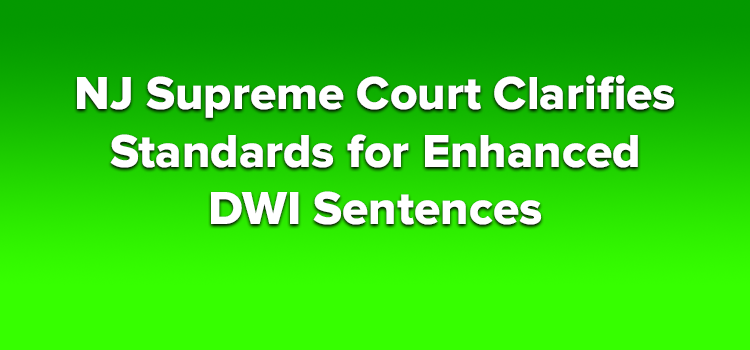In State v. Charudutt J. Patel (A-13-18/081069) (Decided August 7, 2019), the Supreme Court of New Jersey clarified the applicable standards for both indigent and non-indigent defendants who seek relief from an enhanced custodial sentence for a second or subsequent driving while intoxicated (DWI) based on a claimed denial of notice of the right to counsel in an earlier DWI case.

The case expands on State v. Laurick, 120 N.J. 1 (1990), in which the New Jersey Supreme Court held that a defendant is not subject to an enhanced custodial sentence for a second or subsequent DWI conviction if he was not advised of his right to counsel in an earlier DWI proceeding and entered an uncounseled guilty plea or went to trial without counsel.
Facts of State v. Patel
In 2015, defendant Charudutt Patel was charged in two separate instances with DWI. Patel had twice before been convicted of DWI. In 1994, he pled guilty to DWI in the Piscataway Municipal Court. In 2010, Patel pled guilty to DWI in the North Brunswick Municipal Court. Because of the passage of more than ten years between the first and second convictions, Patel was sentenced as a first-time offender.
The two 2015 DWI charges exposed Patel to potential third and fourth DWI convictions. However, Patel alleged that his 1994 conviction in the Piscataway Municipal Court was uncounseled and therefore could not be used for custodial enhancement purposes pursuant to Laurick. Thus, for Laurick purposes, Patel contended that he stood before the court as a second-time offender, and he moved to bar the use of his allegedly uncounseled 1994 DWI guilty plea to enhance any custodial sentence in the pending DWI cases.
In support of his Laurick motion, Patel filed two certifications averring that he was indigent at the time of his 1994 DWI guilty plea, that he appeared in the Piscataway Municipal Court without an attorney, and that the municipal court judge did not advise him of his right to retain one. Patel did retain an attorney in 2010 to represent him on the DWI charge in North Brunswick. In 2016, no documents remained in the Piscataway Municipal Court to disprove Patel’s certifications.
The court denied Patel’s Laurick motion. In a motion for reconsideration, Patel asserted that in 1994, “the Judge never advised me that I had a right to retain an attorney nor did he advise me that I had a right to an appointed attorney at no charge. Therefore, I simply pled guilty.”
The court denied the motion for reconsideration, stating that in the absence of municipal court records, Patel’s certifications were insufficient to prove that he was denied notice of his right to counsel 22 years earlier and that, in any event, he should have filed his Laurick motion in 2010 when he was charged with his second DWI in North Brunswick.
He then pled guilty to the third DWI incident, in exchange for which other charges, including the fourth DWI charge, were dropped. The Appellate Division affirmed.
NJ Supreme Court’s Decision in State v. Patel
The Supreme Court of New Jersey reversed and remanded the matter for proceedings consistent with its opinion. In reaching its decision, the court acknowledged that since Laurick, lower courts have struggled to establish clear standards for both indigent and non-indigent defendants who seek relief from an enhanced custodial sentence for a second or subsequent DWI based on a claimed denial of notice of the right to counsel in an earlier DWI case.
“The present case provides us with the opportunity to give clearer guidance to indigent and non-indigent DWI defendants who face an enhanced custodial sentence based on an earlier uncounseled DWI conviction,” the court wrote. It went on to hold that to secure relief from an enhanced custodial sentence for a subsequent DWI conviction, a non-indigent defendant must establish that in the earlier uncounseled DWI proceeding:
(1) he was not advised or did not know of his right to counsel and (2) had he known of his right to counsel, he would have retained a lawyer. A defendant contending he was indigent must establish that in the earlier uncounseled DWI proceeding (1) he was not advised and did not know of his right to appointed counsel, (2) he was entitled to the appointment of counsel under the applicable financial means test, R. 7:3-2(b), and (3) had he been properly informed of his rights, he would have accepted appointed counsel.
Applying the new standard, the New Jersey Supreme Court concluded that Patel had satisfied his burden of showing that his prior uncounseled DWI conviction was caused by the municipal court’s failure to advise him of his right to counsel. It explained:
In the present case, the Piscataway Municipal Court has indicated that no record remains of whether Patel’s 1994 DWI guilty plea was uncounseled or whether Patel was given notice of his right to counsel and, if indigent, the right to appointed counsel. Patel filed three certifications in the Piscataway Municipal Court in support of his application to bar the use of his 1994 DWI conviction to enhance his custodial term. He attested that the court never advised him of his right to retain an attorney or, if indigent, his right to an appointed attorney at no charge; that had he known that he had the right to an appointed attorney, he “would have taken advantage of that option”; that at the time he appeared in court he was unemployed, “barely scraping by,” and had no money to hire a lawyer; and that he entered his guilty plea without the assistance of counsel.
Based on the foregoing, the court found that “Patel has made clear in his certifications that had he been advised of his right to counsel, he would have sought the assistance of counsel — preferably appointed counsel — and, if he had resources, retained counsel.” It added: “Patel’s assertions — like those of the defendant in Laurick — have gone unrebutted.”
